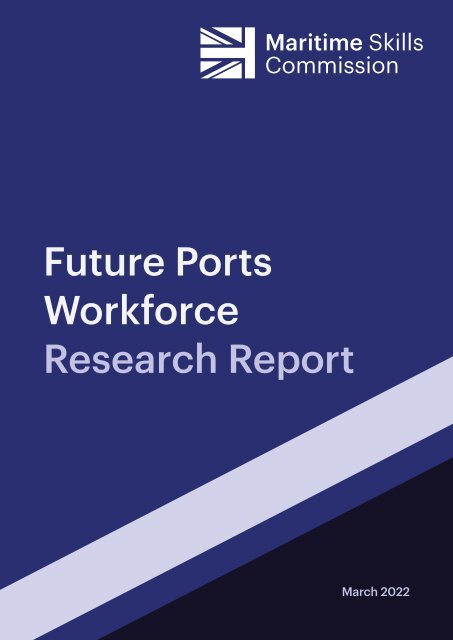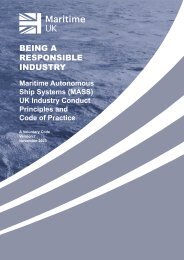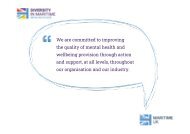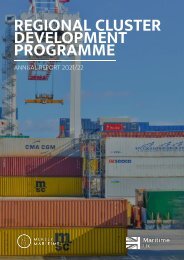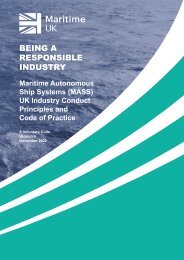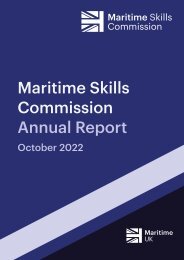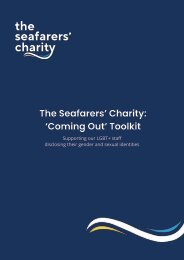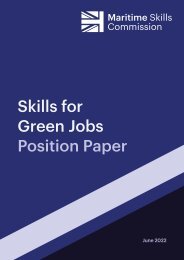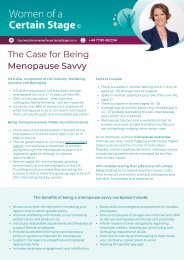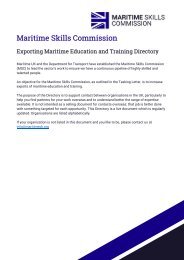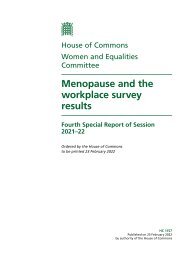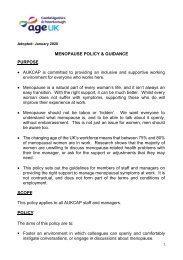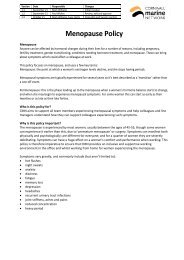Maritime Skills Commission - Future Ports Workforce Research Report - March 2022
You also want an ePaper? Increase the reach of your titles
YUMPU automatically turns print PDFs into web optimized ePapers that Google loves.
<strong>Maritime</strong> <strong>Skills</strong><br />
<strong>Commission</strong><br />
<strong>Maritime</strong> <strong>Skills</strong><br />
<strong>Commission</strong><br />
<strong>Future</strong> <strong>Ports</strong><br />
<strong>Workforce</strong><br />
<strong>Research</strong> <strong>Report</strong><br />
<strong>March</strong> <strong>2022</strong>
<strong>Future</strong> <strong>Ports</strong> <strong>Workforce</strong> <strong>Research</strong> <strong>Report</strong> - 1<br />
Summary<br />
The UK ports sector has been for centuries a bedrock<br />
employer for communities all around the UK. It’s proud<br />
commitment to skills can be seen in the provision of high<br />
quality apprenticeships, for example, and the number of<br />
senior leaders who have progressed though the ranks<br />
of port operators.<br />
But times are changing, for society as a whole and the<br />
environment that ports operate within. New technologies,<br />
shifts in policy and demographics, and physical changes<br />
are transforming ports; in turn, this evolution is throwing<br />
up new challenges, as well as opportunities, when it comes<br />
to recruitment and training.<br />
Sometimes challenges are also opportunities. The<br />
challenge of growing the diversity of the sector opens up<br />
new sources of talent. Technology and more automation<br />
challenges traditional ways of working but also offers<br />
important safety and efficiency benefits.<br />
What does it mean to work in a port now, and what will<br />
the future ports workforce look like? What skill sets will be<br />
required, and what actions must the industry take in terms<br />
of training its existing workforce and attracting new people<br />
with those skills?<br />
and roundtables, covering industry and other key<br />
stakeholders like trade unions, the study mapped the<br />
situation today, some key trends looking forward and asked<br />
some hard questions of the sector itself.<br />
Among its recommendations, the report calls for a<br />
clear lead on port skills, more collaboration to drive<br />
improvements in diversity, and an in-depth future skills<br />
mapping exercise. Sharing of best practice, identifying<br />
near-term skills gaps, developing more proactive<br />
approaches to upskilling, reskilling and retraining,<br />
collective working to deliver on key skills policy areas, and<br />
development of HR capability across the sector are also<br />
recommended.<br />
Change is not optional, it is essential. What is undimmed<br />
is the port’s sector commitment to skills and bringing<br />
forward new generations of talent – the talent that keeps<br />
the goods moving that our island nation relies on and that<br />
grows prosperity and opportunity all around the UK’s coast.<br />
Authorship and acknowledgements: This summary report<br />
has been produced by the UK Major <strong>Ports</strong> Group for<br />
the <strong>Maritime</strong> <strong>Skills</strong> <strong>Commission</strong> as a result of a research<br />
proposal made to the <strong>Commission</strong>. The underlying research,<br />
undertaken by Dr Margaret Hawthorne and Dr Pauline<br />
Anderson of the University of Strathclyde Business School,<br />
was funded by both the <strong>Commission</strong> and the UKMPG. The<br />
views expressed herein are those of the author/s of the<br />
summary. The report does not necessarily reflect the views<br />
of <strong>Maritime</strong> UK and the <strong>Maritime</strong> <strong>Skills</strong> <strong>Commission</strong>.<br />
The importance of the Review was first highlighted in the<br />
<strong>Maritime</strong> <strong>Skills</strong> <strong>Commission</strong>’s Labour Market Intelligence<br />
Scoping <strong>Report</strong> in October 2020.<br />
A detailed study carried out by Strathclyde Business<br />
School on behalf of the UK Major <strong>Ports</strong> Group (UKMPG)<br />
and commissioned by the <strong>Maritime</strong> <strong>Skills</strong> <strong>Commission</strong><br />
considered the future workforce needs of a sector that<br />
is often ‘hidden’ and frequently the subject of outdated<br />
perceptions and expectations by those outside the<br />
industry. Through a programme 1 of thorough interviews<br />
1. More detail on the content of the research programme is described on page 4.
2 - <strong>Future</strong> <strong>Ports</strong> <strong>Workforce</strong> <strong>Research</strong> <strong>Report</strong><br />
Setting the scene<br />
Key themes of the port sector context<br />
However, it is important to remember there will<br />
The background – shifting port<br />
sector dynamics<br />
<strong>Ports</strong> are far from alone in anticipating major changes in<br />
workforce requirements in the future. Many industries are<br />
set to be transformed by a range of current and anticipated<br />
drivers of change; some of these changes will impact very<br />
specifically on UK ports.<br />
The key drivers include the advances in and implementation<br />
of new technologies, in particular in the areas of digitalisation<br />
and automation; policy shifts, for example around the need<br />
for diversity and decarbonisation ‘just transition’ agendas;<br />
demographic shifts with an ageing workforce and the<br />
younger generations’ changing expectations in the world of<br />
work; and physical transformations, for example with ports<br />
becoming hubs for wider economic activity.<br />
The technology already available and emerging under the<br />
‘Fourth Industrial Revolution’ umbrella is set to transform<br />
the way in which ports operate on a day-to-day basis. The<br />
UKMPG report highlights the likely impact of technologies<br />
such as the Internet of Things (IoT), Blockchain, Big Data<br />
and Advanced Industrial Robotics, bringing increased<br />
automation, sensors, drones, data gathering, storage and<br />
exchange, and production and warehousing systems, and<br />
notes that these and other advances such as networked<br />
systems and seamless engineering will require investment<br />
in hardware, software and training.<br />
Technology: The Implications for<br />
Jobs and <strong>Skills</strong><br />
<strong>Ports</strong> have already experienced waves of mechanisation<br />
and, increasingly automation. So technology induced<br />
change – and its implications on skills and work force<br />
is not new. However, the current speed of change and<br />
anticipated even further acceleration being driven by<br />
the data revolution – with major ports being hubs for<br />
data as well as goods – makes the current challenges<br />
particularly acute.<br />
An increased demand for IT skills is inevitable, but a key<br />
challenge is that 90% of UK employers report digital<br />
skills deficits, and about 50% are concerned that this<br />
digital skills gap has already negatively impacted the<br />
productivity, competitiveness and profitability of their<br />
business.<br />
So ports are not alone. But that is of very limited<br />
comfort. Our need is as acute as a range of other sectors<br />
and ports must up their game to attract more talent in<br />
these in demand areas. Here there is an interrelationship<br />
with the diversity theme. <strong>Ports</strong> simply must improve their<br />
diversity efforts if they are to successfully expand their<br />
pool of addressable potential talent.<br />
But the challenge – and indeed need – is not just about<br />
new hires. In ports, while some skills and jobs are in<br />
greater demand, there is a decline in the demand for<br />
others. For example, some port operative routine tasks<br />
have already been partially automated and automation is<br />
expected to extend to other areas.<br />
The report notes: “Sensitivity to such changes is needed,<br />
and retaining, retraining and upskilling the existing<br />
workforce in the transition to the ports of the future will<br />
be important.”<br />
Whilst much focus – economy wide – is placed on the<br />
hiring element of the new skills equation, there is a need,<br />
opportunity and indeed responsibility to develop the<br />
pathways for the existing workforce to transition to the<br />
increasingly digitised workplace.<br />
still be a need for a ‘baseload’ of more traditional<br />
skills, it says. Even where demand for some jobs<br />
and skills is shrinking, replacement demand will<br />
be significant.<br />
The Challenge and Opportunity<br />
of Diversity<br />
As in many other ‘traditional’ industries, there is a<br />
relative lack of diversity in UK ports – gaining access<br />
to a more diverse, and therefore wider, talent pool is<br />
vital in terms of addressing the current demographic<br />
profile, tackling skills gaps and meeting future<br />
needs.<br />
There is a determined push across many port<br />
operators to attract and retain a more gender diverse<br />
future ports workforce. This makes sense purely in<br />
business terms; <strong>Maritime</strong> UK has noted that more<br />
diverse companies are better able to attract top<br />
talent and improve their customer and employee<br />
satisfaction and decision making, “leading to a<br />
virtuous cycle of increasing returns”.<br />
However, gendered stereotypes and biased<br />
assumptions are often embedded within workplace<br />
cultures and can have an impact on recruitment<br />
selection decisions and work practices.<br />
There is also a need for better portrayal or ‘branding’<br />
of the industry, the roles it offers and the modern<br />
port as a workplace in order to attract a more diverse<br />
range of talent, including the younger generation.<br />
The sector recognises the challenge. Determined<br />
efforts to meet this challenge are underway. But more<br />
needs to be done, both at a port operator and<br />
sector level.
4 - <strong>Future</strong> <strong>Ports</strong> <strong>Workforce</strong> <strong>Research</strong> <strong>Report</strong> <strong>Future</strong> <strong>Ports</strong> <strong>Workforce</strong> <strong>Research</strong> <strong>Report</strong> - 5<br />
DEVELOPMENT<br />
Figure 1: Adapted from Anderson and Warhurst, 2012: 117<br />
The research, analysis and synthesis for the <strong>Future</strong> <strong>Ports</strong><br />
<strong>Workforce</strong> project was undertaken by Strathclyde Business<br />
School, principally Dr Pauline Anderson (Senior Lecturer,<br />
Work, Employment and Organisation) and Dr Margaret<br />
Hawthorne.<br />
The Strathclyde team adopted the concept of the ‘skill<br />
ecosystem lens’, exploring four dimensions – skills supply,<br />
demand, development and deployment – in its interviews<br />
and analysis.<br />
<strong>Research</strong> framework<br />
A UK <strong>Ports</strong> Skill Ecosystems Lens<br />
Actors/Institutions/<br />
Relationships<br />
Actors/Institutions/<br />
Relationships<br />
Following a broadly based literature review and period of<br />
desk research, interviews and roundtables were held with<br />
21 people with deep experience in the workforce field:<br />
nine port HR directors, three trade union representatives,<br />
two comparative sector representatives (from the<br />
construction and transport sectors), four port learning and<br />
SUPPLY<br />
UK PORTS<br />
EMPLOYMENT<br />
DEMAND<br />
development specialists, and three strategic stakeholders<br />
(two <strong>Commission</strong>ers from the <strong>Maritime</strong> <strong>Skills</strong> <strong>Commission</strong><br />
and a previous CEO of Port <strong>Skills</strong> and Safety, a ports sector<br />
collective body).<br />
All interviews were recorded and transcribed in line with<br />
academic best practice, before forming key evidence for the<br />
analysis and synthesis stages.<br />
A summary of the findings from this extensive background<br />
of source material are set out below, grouped by each ‘skill<br />
ecosystem lens’:<br />
<strong>Skills</strong> supply<br />
Actors/Institutions/<br />
Relationships<br />
Actors/Institutions/<br />
Relationships<br />
Outdated perceptions of port work do not do justice<br />
to the broad range of job roles within the sector. For<br />
example, one HR director said there is a perception that<br />
ports and logistics are a heavy industry involving working<br />
in bad weather conditions – whereas, in fact, there is a<br />
variety of roles offering a meaningful career, including<br />
engineering, procurement, commercial, HR, legal, finance<br />
and IT. “It’s important to us to get that message out there<br />
so people understand that it’s not just about a truck,<br />
a warehouse or somebody stood on a dock edge,<br />
it’s more than that.”<br />
We are an island – and yet, the ‘hidden’ nature of the<br />
industry is another obstacle when it comes to attracting<br />
young people to the sector. One stakeholder noted: “The<br />
biggest reason why there are no young people coming into<br />
it – they don’t know it exists.”<br />
There was a strong feeling that careers and teaching<br />
professionals could do more to help raise awareness or<br />
and champion the sector – and even that these<br />
professionals often perpetuate the outdated stereotypes<br />
of the sector and job roles on offer.<br />
A more diverse workforce is key. Without this, the industry<br />
is missing out on the opportunity to attract a wider crosssection<br />
of the workforce. For example, young women do<br />
not see a port or harbour as an attractive career option.<br />
There is a ‘diversity branding’ challenge for ports, which<br />
have not quite shifted away from the ‘pale, male and<br />
stale’ image.<br />
Barriers to widening diversity need addressing – for<br />
example, inflexible working patterns and unsociable hours<br />
are likely to impact women disproportionately, and ports<br />
need to understand the changing work preferences and<br />
orientations of the next generations of workers.<br />
More work needs to be done around workforce<br />
planning.<br />
<strong>Skills</strong> demand<br />
When it comes to the potential impact of technology on<br />
future skills demand, views of the interviewees varied.<br />
Some acknowledged that the introduction of new<br />
technologies in ports is gathering pace – but there was<br />
an uncertainty about the timescale and the impact on the<br />
workforce. In the immediate term, it was suggested that<br />
current reliance on a lot of manual labour will persist but<br />
that change is inevitable and lack of preparation risks<br />
further problems.<br />
Others expected that the advances in technology will<br />
reduce demand in some areas of port work, and that<br />
automation will markedly impact manual labour. For<br />
example, autonomous truck technology could replace the<br />
need for HGV drivers in the non-too-distant future.<br />
There are interesting challenges relating to the anticipated<br />
impact of autonomation and related recruitment issues.<br />
Some ports see contractor or agency staff as a means of<br />
supporting a core of existing workers’ jobs.<br />
New technologies within the ports have led to increased<br />
demand for more IT savvy workers and more non-manual<br />
workers – for example, ports are looking for people with<br />
skills in software and data analysis.<br />
More generally, there is a broad picture of relatively low<br />
levels of recruitment reflecting low levels of ‘churn’, with<br />
ports reporting limited replacement recruitment demand<br />
because of low levels of workforce exit.<br />
There is a need to rethink existing HR recruitment and<br />
selection processes and practices – one HR director noted:<br />
“The core group of people that we’ve recruited historically<br />
are not what we are targeting now.”<br />
As a piece of brutal reflection there was some<br />
acknowledgement that diversifying the talent pool can<br />
be difficult due to unconscious bias creeping in to hiring<br />
decisions, leading to organisational ‘cloning’.<br />
There are good examples of ports trying to address<br />
recruitment problems, including through gender diversity<br />
strategies and policies, introducing assessment centres,<br />
insisting on panel interviews and moving to more flexible<br />
working practices. However, it is also clear that there is<br />
further to go and an active debate about the extent and<br />
effectiveness of various strategies.
6 - <strong>Future</strong> <strong>Ports</strong> <strong>Workforce</strong> <strong>Research</strong> <strong>Report</strong><br />
<strong>Skills</strong> development<br />
<strong>Skills</strong> gaps are not just confined to ‘new’ areas like data and<br />
IT. Core engineering skills are generally in high demand<br />
across the economy, and ports can struggle to compete<br />
for the talent. For example, the offshore wind sector is said<br />
to be paying higher rates to attract high-quality engineers,<br />
and ports have lost people to that sector.<br />
Engineering apprenticeships are viewed as an important<br />
mechanism for sustaining the future ports engineering<br />
workforce. However, while there is a longstanding tradition<br />
of engineering apprenticeships within ports, it seems that<br />
the ageing ports workforce is focusing minds on the evergrowing<br />
skills gap. One port, noting that most of its engineers<br />
are over 50, said it usually takes on two or three apprentices<br />
a year, but this will have to be increased significantly.<br />
Apprenticeships are effective in helping ports to ‘grow their<br />
own’, as apprentices tend to stay with the business, across<br />
many disciplines.<br />
Engineering apprenticeships may need to be revisited<br />
to ensure they are fit for purpose in the light of advancing<br />
technology; there was a view that engineers will have to be<br />
multidisciplined in the future.<br />
Some smaller ports are committed to delivering highquality<br />
apprenticeships but may not have the capacity to<br />
take on more apprentices. Also, the bureaucracy around<br />
apprenticeships is seen as counterproductive.<br />
Upskilling the existing port operative workforce is seen<br />
as a particular challenge, with a number of explanations:<br />
these roles were traditionally filled by people who had not<br />
necessarily excelled at school; the workforce is now ageing<br />
and ‘set in their ways’; and operatives can lack basic skills,<br />
most notably in IT.<br />
Even using the technology already in place today can<br />
be outside the comfort zone of port operators and line<br />
managers; the IT skills gap can lead to a tendency to<br />
‘go back to old ways of working’ rather than maximise<br />
the technology available.<br />
<strong>Skills</strong> deployment<br />
The interviews suggested that the ports sector is<br />
broadly thought of as ‘traditional’ and ‘with a big heart’.<br />
On the more tangible side, ports tend to offer<br />
competitive pay, terms and conditions, including for<br />
what may be considered as low-skilled but still<br />
valuable jobs.<br />
However, ports often use agency workers to deal with<br />
seasonal and other peaks, and there was concern on the<br />
trade union side that a shift to more widespread use of<br />
agency staff may ‘fragment terms and conditions of<br />
the workforce’.<br />
The industry has moved away from the ‘racy calendar’<br />
environment of the past, and attitudes that would be<br />
at odds with a forward-thinking workplace looking for<br />
a more diverse workforce. As one interviewee put in:<br />
“The seventies way of people behaving has gone and<br />
we’ve set the standards in terms of what’s acceptable<br />
and what isn’t.” Nevertheless, there is acknowledgement<br />
that inflexible working arrangements can present<br />
challenges to women in particular in operational<br />
roles.<br />
While promoting a culture, policies and practices in<br />
line with bringing in a more diverse workforce was seen<br />
as key, the fact that ‘age’ is a protected characteristic<br />
was not apparently considered. It seems that many in<br />
the sector are resigned to waiting for older workers to<br />
retire, instead of putting their skills to work in the best<br />
way and/or preparing them for change.<br />
Stakeholders and<br />
partnerships<br />
Who leads the ports skills agenda? HR directors were<br />
generally unclear. There is widespread recognition that<br />
the UK Major <strong>Ports</strong> Group, British <strong>Ports</strong> Association and<br />
Port <strong>Skills</strong> and Safety all play important roles in this,<br />
but there was a lack of clarity around their respective<br />
remits. This may partly explain an apparent disconnect<br />
between maritime-wide strategies and initiatives, and<br />
related activities at port level.<br />
Networking and sharing experiences about what works<br />
well (or does not) is seen as valuable.<br />
Not all HR Directors are ‘equal’ – some have more power<br />
and influence in their organisations than others.<br />
The view was that real change will only happen if<br />
management and senior people and the influencers are<br />
prepared to change.<br />
Covid-19 has shone a spotlight on HR activities and<br />
changed attitudes to mental health, emotional health,<br />
culture and engagement.<br />
Trade union reps were keen to highlight the value of<br />
working in partnership to effect change, but there was also<br />
evidence of tension between employers and some<br />
employee bodies. Part of this tension seems linked<br />
to uncertainty about the longer-term impact of new<br />
technologies and the potential that automation will lead<br />
to job losses.<br />
Figure 1: Anderson, P. and Warhurst, C. (2012). ‘Lost in Translation?<br />
<strong>Skills</strong> Policy and the Shift to Skill Ecosystems’, in D. Nash and<br />
T. Dolphin (eds), Complex New World: Translating New Economic<br />
Thinking into Public Policy, London: IPPR, pp. 109–120.
8 - <strong>Future</strong> <strong>Ports</strong> <strong>Workforce</strong> <strong>Research</strong> <strong>Report</strong> <strong>Future</strong> <strong>Ports</strong> <strong>Workforce</strong> <strong>Research</strong> <strong>Report</strong> - 9<br />
The <strong>Future</strong> <strong>Ports</strong> <strong>Workforce</strong><br />
Recommendations<br />
The report makes eight key<br />
1<br />
4<br />
7<br />
recommendations. Given that<br />
there are differing areas of<br />
good practice across individual<br />
port operations, however, the<br />
authors note that it is difficult<br />
to make sweeping company<br />
level recommendations. The<br />
Clarify which body is leading<br />
on port skills<br />
The absence of a lead body on the issue of port skills<br />
is holding back the sector. Clarity is needed on which<br />
organisation or body is leading; this lead should play<br />
a key role in addressing the disconnect between<br />
maritime-wide strategies and initiatives, and related<br />
activities at port level.<br />
Eating the elephant a mouthful at a<br />
time – focused best practice sharing<br />
and ‘sprints’<br />
Instead of trying to address all skill issues at once,<br />
an initial collective focus on one area, such as skills<br />
supply, would be useful. The researchers uncovered<br />
a lot of examples of innovative/good practice within<br />
ports, and these need to be shared more widely.<br />
Working together to inform a better skills<br />
policy and funding landscape<br />
The ports sector should improve its collective stance<br />
and advocacy on key skills policy areas, such as the<br />
Apprenticeship Levy.<br />
8<br />
recommendations therefore<br />
focus on collective actions.<br />
2<br />
5<br />
Developing the HR capability across<br />
the sector<br />
More joint working within the ports and<br />
Investigate priority near-term skills<br />
There are good examples of HR professionals<br />
maritime sector to drive improvements<br />
gaps/shortages, including learning<br />
coming together now to share good practice and<br />
in diversity<br />
lessons from sectors<br />
learnings. This should be increased, looking not<br />
only at workforce development tactics but also how<br />
There should be a common effort in examining what<br />
The sector should confirm the priority areas of<br />
HR insight and capability can be better built into<br />
measures are and are not being effective, more<br />
concern and formulate a sector level response. A more<br />
corporate strategy.<br />
sharing of good practice, and a concerted approach<br />
nuanced understanding of issues around the quality<br />
to bring in lessons from outside the sector.<br />
and quantityof engineering apprenticeships is needed.<br />
The sector also needs to consider how its proposition<br />
3<br />
compares with competing sectors for similar skills.<br />
Undertake a systematic review of how<br />
skills are used now, and anticipated<br />
6<br />
changes in skills/job requirements in<br />
Develop more proactive approaches<br />
the future<br />
to upskilling, reskilling and retraining<br />
the current workforce<br />
The lack of clarity about future skills needs requires<br />
urgent attention. The sector should consider an<br />
A ‘just’ transition to future ports requires strategies<br />
in-depth, quantified future skills pipeline mapping<br />
and interventions that will ensure that the existing<br />
exercise, with particular focus on the projected<br />
workforce, across ages and job roles, can play their<br />
impact of automation.<br />
full part.
<strong>Future</strong> <strong>Ports</strong> <strong>Workforce</strong> <strong>Research</strong> <strong>Report</strong> - 11<br />
The <strong>Future</strong> <strong>Ports</strong> <strong>Workforce</strong><br />
Next steps<br />
The recommendations made in the <strong>Future</strong> <strong>Ports</strong> <strong>Workforce</strong><br />
are comprehensive and, rightly given the importance of<br />
the subject, ask some fundamental questions of the ports<br />
sector itself as well as the wider skills and development<br />
infrastructure.<br />
As the report notes in its first recommendation, clear<br />
sector level leadership is key. The Port <strong>Skills</strong> and Safety<br />
organisation has revitalised its skills focused strategic<br />
pillar, including diversity and inclusion, and is increasing<br />
its resourcing in this area. Given the underlying Port <strong>Skills</strong><br />
and Safety remit and the renewed commitment to the<br />
workforce development agenda it is the right time<br />
to clearly establish Port <strong>Skills</strong> and Safety leadership on<br />
the issues and opportunities covered in the <strong>Future</strong><br />
<strong>Ports</strong> <strong>Workforce</strong>.<br />
The ports trade associations, the UK Major <strong>Ports</strong> Group and<br />
the British <strong>Ports</strong> Associations are committed to working<br />
with Port <strong>Skills</strong> and Safety on the skills agenda. All three<br />
organisations share a common vision of a vibrant, skilled<br />
and diverse workforce as a critical foundation of the<br />
future UK ports sector.<br />
Port <strong>Skills</strong> and Safety will be bringing forward their full<br />
skills strategy shortly. However, to maintain momentum a<br />
number of tangible priority activities have been identified<br />
to progress a number of the report’s recommendations:<br />
A ‘Sprints’ programme on key areas of workforce planning<br />
and development. These are envisaged to be one day<br />
events, using practices from innovation sectors focused<br />
on key workforce landscape dynamics. The aim is to<br />
uncover tangible, tactical quick-wins as well as longer<br />
term strategic requirements. The first one is anticipated<br />
to be on ‘Supply’ – building the local and national pipeline<br />
of talent, responding to Recommendation 4 (Eating the<br />
elephant a mouthful at a time – focused best practice<br />
sharing and ‘sprints’);<br />
A ‘HR masterclass’ series. We aim to hold a series of<br />
practitioner-driven roundtable ‘master classes’ for HR<br />
professionals across the sector. The first event under<br />
development is “Driving progress on diversity – what’s<br />
working, what’s not” in conjunction the <strong>Maritime</strong> UK<br />
Diversity network. This responds to Recommendations 2<br />
(More joint working within the ports and maritime sector<br />
to drive improvements in diversity) and 8 (Developing the<br />
HR capability across the sector).<br />
Sharing and learning with other sectors in coastal<br />
communities. We aim to hold a roundtable with the<br />
offshore energy sector to better understand approaches<br />
to workforce developments and investigate any common<br />
challenges and opportunities for growing talent supply<br />
and development in coastal communities. This responds<br />
to Recommendation 5 (Investigate priority near term skills<br />
gaps/shortages, including learning lessons from sectors).<br />
We will look to work with the <strong>Maritime</strong> <strong>Skills</strong> <strong>Commission</strong><br />
to leverage broader activity in building a detailed<br />
understanding of the future skills needs of the ports<br />
sector. For example, we would look to be active<br />
participants in the <strong>Maritime</strong> <strong>Skills</strong> <strong>Commission</strong>’s and<br />
quantitative ‘future workforce pipeline modelling' project<br />
for maritime to ensure a robust ports outlook. This<br />
responds to Recommendation 3 (Undertake a systematic<br />
review of how skills are used now, and anticipated<br />
changes in skills/job requirements in the future).
30 Park Street<br />
London<br />
SE1 9EQ<br />
020 7417 2837<br />
info@maritimeuk.org<br />
maritimeuk.org<br />
© Copyright <strong>Maritime</strong> UK <strong>2022</strong>


